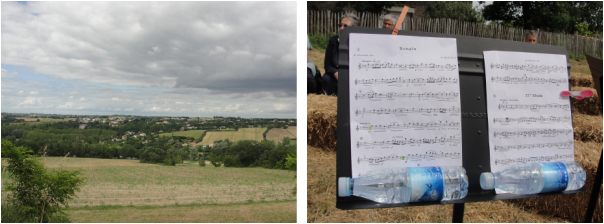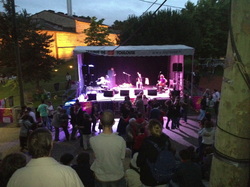 Playing clarinet with the Frenchmen in the countryside.
Playing clarinet with the Frenchmen in the countryside. Everything happened rather unexpectedly. I found the ensemble via Facebook, exchanged some emails with the director and attended my first rehearsal with the ensemble the previous Thursday. I enjoy the group immensely. The ensemble is made up of professionals, high-level amateurs and conservatory students. They welcomed me warmly, giving me compliments on my ability to speak French and sight-read music, and afterward I was invited to play for the group's last concert of the season.
 This is the poster for the event we played at – definitely "country-style."
This is the poster for the event we played at – definitely "country-style." We ate many assorted delicious farm products (which were unidentified, but how can you go wrong?), and then we played at three sites around the festival.
At the first station, a video camera came to tape us and some of my friends came out to watch us play. At the second station, we kept being interrupted by a lady with a very strong Southwestern accent making announcements (and I entertained my fellow clarinetists in my attempts to imitate her speech).
The third station was on the top of a very large hill. It was probably at least a half-mile walk up and quite steep. And remember that we are carrying clarinets and stands on a very windy day. I was told after the hike that the ensemble "rarely" plays gigs like this.
 The view from the top of the hill (left). Our attempts to keep the music on the stand (right).
The view from the top of the hill (left). Our attempts to keep the music on the stand (right). All in all, I wouldn't have imagined a debut like this, but it was fabulous. It is summer vacation now in France, and I am sad to have a couple of months without this musical camaraderie. However, on the trek back down the hill, the director offered me a first clarinet position in September for the new season. I am looking forward to continuing with this welcoming and musically skilled ensemble in the fall.


 RSS Feed
RSS Feed